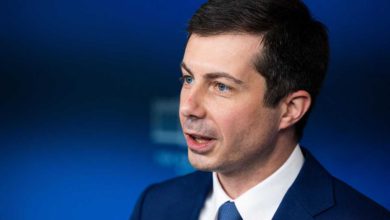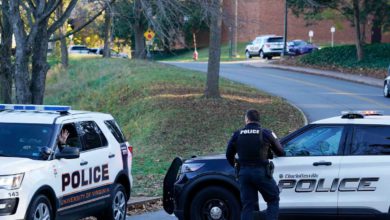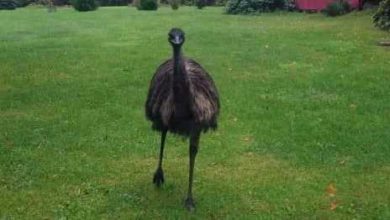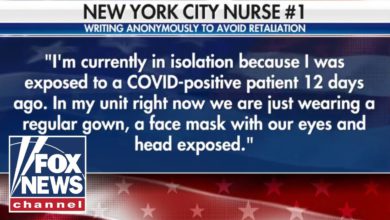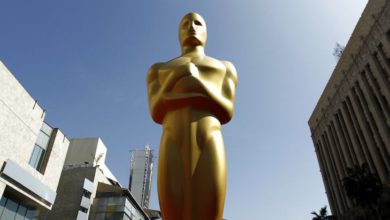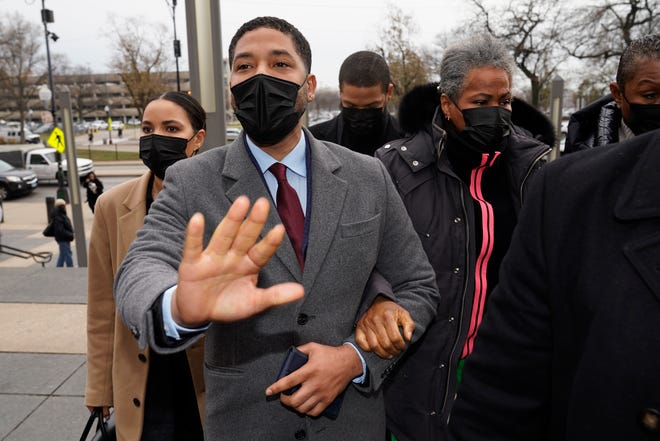
Jussie Smollett returned to the witness stand Tuesday at his trial in Chicago, where the former “Empire” actor repeatedly denied claims that he staged an anti-gay, racist attack on himself and called brothers Abimbola and Olabinjo Osundairo, who testified against him, "liars."
Lawyers for the former “Empire” actor rested their case shortly after Smollett finished a second day of testimony at the Chicago courthouse on charges he lied to police about the January 2019 attack. Prosecutors said they had no other witnesses to call, and Judge James Linn scheduled closing arguments for Wednesday.
Smollett told jurors Monday "there was no hoax" and that the Osundairo brothers' testimony that he paid them $3,500 to carry out the fake attack was "100% false." He explained that the $3,500 check to Abimbola Osundairo was for meal and workout plans because he was trying to get toned for an upcoming music video.
Defense attorneys have suggested the Osundairo brothers were motivated to accuse Smollett of staging the hoax because they disliked him and saw an opportunity to make money. They suggested that after the two brothers were questioned by police about the alleged attack, they asked Smollett for $1 million each to not testify against him at trial.
Smollett’s lawyers also have argued that Chicago police rushed to judgment when they brought charges against Smollett, and suggested a third person may have been involved in the attack.
Smollett, 39, is charged with felony disorderly conduct for what law enforcement and prosecutors believe was a false police report about the alleged attack. The Class 4 felony carries a prison sentence of up to three years in prison, but experts say if Smollett is convicted he likely would be placed on probation and perhaps ordered to perform community service.

Here is everything else that has happened during the trial so far.
Jussie Smollett timeline: A look back at the ex-'Empire' star's alleged attack, hoax claims
Day 6: Defense rests, Jussie Smollett calls Osundairo brothers 'liars'
Under cross-examination by special prosecutor Dan Webb, Smollett said Tuesday that a few days before the alleged attack he picked up Abimbola Osundairo in his car to go workout and that Osundairo’s brother, Olabinjo Osundairo, came along. Smollett denied the brothers’ earlier testimony that they drove around together – circling the area where the alleged attack occurred three times – as part of a “dry run” for the fake assault. He said circling the area was not unusual behavior for him, and that he called off the plan to work out because he didn’t want to work out with Olabinjo Osundairo, whom he hadn’t invited along.
Smollett, who was calm throughout hours of testimony with his defense attorney Monday, seemed to grow more irritated during his exchanges with Webb on Tuesday, at one point telling the veteran prosecutor he doesn’t understand the social media app Instagram. Webb’s cross-examination also revealed some inconsistencies in Smollett’s testimony, including about whether he sent private messages to confirm the timing of the alleged attack and whether his attackers were white, as police say Smollett told them.
When Webb asked Smollett if he sent private messages regarding the timing of the fake attack to Abimbola Osundairo using the app on the night of the alleged attack Smollett responded, “there was no fake attack” and denied sending the messages. After Webb showed Smollett four messages that Smollett sent Abimbola Osundairo that night while the actor was at an airport because his flight home to Chicago was delayed, Smollett told Webb: “If you say so, sir.”
In the final message – sent at 12:41 a.m. on Jan. 29, 2019, or about 90 minutes before the alleged attack – Smollett told Osundairo that he had finally made it home. Smollett testified he was sending the messages to arrange a workout session, not a fake attack.
Of the alleged attack, Smollett previously testified that when he turned to confront the person, a man hit him in the head and he fell to the ground, where he said another man kicked him before the attackers ran away. Asked by Webb Tuesday whether he’s saying the brothers were his attackers, Smollett replied, “No, I don’t know. There’s no way for me to know that.” Webb then asked if Smollett recognized the voice of Abimbola Osundairo – who goes by Bola – during the incident.
“In that moment, I’m not going to stop and say, ‘Hey Bola is that you?’” Smollett testified.
Smollett also said of the Osundairo brothers’ testimony that he staged the attack: “They are liars.”
Day 5: Jussie Smollett first takes the stand
Smollett told the jury how he grew up in a close-knit family of six children and started performing as a child actor before getting more into music. He said he “came to terms with my sexuality” in his early 20s, when he got involved in charity organizations, including a group that fights AIDS in the Black community.
He said he auditioned for a role on “Empire” of a singer who is gay because he had never seen a Black man portrayed that way. By Season 5, Smollett said he was being paid $100,000 per episode.
Now, he said, "I’ve lost my livelihood."
Smollett said he met Abimbola Osundairo in 2017 at a club, where he learned Osundairo also worked on the set of “Empire.” He said the two men did drugs together and went to a bathhouse, where Smollett said they “made out." Over time, he said the two men did more drugs together and participated in sex acts together. Abimbola Osundairo testified last week that he and Smollett didn’t have a sexual relationship.
Smollett testified that he met Abimbola's brother, Olabinjo, but that they didn't speak and “he kind of freaked me out.” He said Abimbola Osundairo made it seem like the men needed to “sneak off” when they were together around his brother. Smollett said he never trusted Olabinjo Osundairo.
On the day of the alleged attack, Smollett told jurors he was walking home after buying a sandwich when someone yelled to him about "Empire" and shouted a racist, homophobic remark. Smollett said the man walked quickly toward him after the actor turned around to confront the person.
“I would like to think I landed a punch. But I don’t know if it landed,” Smollett said, telling the jury that the man hit his left temple. He said he slipped and they tussled on the ground for up to 30 seconds. Smollett said he saw a second person – who he believes kicked him on his side – as that person ran away.
Smollett said he assumed the person who attacked him was white because he used a racial slur and shouted it was “MAGA country.” Abimbola and Olabinjo Osundairo, who are Black, testified last week that Smollett instructed them to yell “this is MAGA country” during the fake assault.
Smollett said he picked up his phone and told the person he had been talking to that he “got jumped.” He noticed he had a noose around his neck as he got up, grabbed his sandwich and went up to his apartment. Smollett said he removed the noose but a friend who was at his apartment called police and told him to put the noose back on so officers could see it. Smollett said he was upset police had been called because he would never have done so.
“I am a Black man in America. I do not trust the police,” Smollett said. “I am also a well known figure at that time and I am an openly gay man.”
Under cross-examination, Smollett said he refused to give Chicago police his cellphone for their investigation because he wanted his privacy. Asked by Webb if he was concerned the phone would show several calls to Abimbola Osundairo, Smollett said no.
Smollett also testified that Abimbola Osundairo told him he could get an herbal steroid that encourages weight loss but is illegal in the U.S.“ on the low” – or secretly – while he was on an upcoming trip to Nigeria.
Abimbola testified that Smollett sent him a text message about talking “on the low,” and that during the conversation Smollett asked him about helping to stage the attack. Smollett said Monday that message was in reference to the illegal steroid.
When Webb asked about Abimbola’s testimony that Smollett recruited him for a hoax, Smollett replied: “Fully false, 100% false.” He also said “absolutely not” when his defense attorney asked if he gave the Osundairo brothers $100 to pay for supplies for the fake attack.
Prosecutors say Smollett staged the attack because he was unhappy with the “Empire” studio’s response to hate mail he received. Brett Mahoney, who produced “Empire” in Chicago, testified earlier Monday that Smollett called him after the hate mail was sent to the set. “We were obviously all very upset about the letter,” Mahoney said, adding that law enforcement was contacted and the letter turned over to authorities. He said Smollett agreed to added on-set security, but didn’t want anyone following him home because he felt it was too intrusive.
Also Monday, security guard Anthony Moore said that around the time of the alleged assault, he saw a person on the ground at the end of the block and two men running, one of whom was white. Moore said he told police what he saw, but when he was later questioned by the special prosecutor he felt pressured to change his story. Moore testified that he signed a statement that said the person was “possibly” a Black man, but that he felt “pressure and threatened to put something out there that I didn’t see.”
Under cross-examination, Moore said he only saw the man for one to two seconds. He also said he thought the men were fooling around, and that the two men were laughing as they ran by him.

Day 4: State rests case, Olabinjo Osundairo describes 'crazy idea' to stage hoax
After a three-day presentation of evidence, special prosecutor Webb told the presiding judge Thursday, Dec. 2 that the prosecution was finished. The defense began its case immediately, calling Brandon Moore, Smollett’s music manager at the time.
OlabinjoOsundairo took the stand earlier in the day to echo his brother Abimbola's testimony the day before that Smollett requested they play assailants in the allegedly staged attack.
Olabinjo Osundairo said Smollett told him he received hate mail at the TV studio in Chicago “and he had this crazy idea of having two MAGA supporters attack him."
They opted to pour bleach on Smollett, Olabinjo Osundairo said, because he wasn’t comfortable using gasoline. He said Smollett wanted his brother to do the punching, and that it should look like he fought back.
Olabinjo Osundairo also addressed the defense's contention that the brothers were driven by homophobia. He testified that he has nothing against gays and the jury was shown a photo of the siblings taking part in Chicago’s 2015 gay pride parade dressed as trojan warriors.
During cross examination, defense attorney Shay Allen asked Abimbola Osundairo, who worked as a stand-in on the Chicago set of “Empire,” if he tried to get a $5,000-per-week job as Smollett’s security and if after he was questioned by police and released he told Smollett he and his brother wouldn’t testify at his trial if they were each paid $1 million. AbimbolaOsundairo responded “No sir” to both.
In follow-up questioning by Webb, Abimbola Osundairo said he never thought Smollett would go to the police to report the fake attack as a real hate crime. He said Smollett told him that he wanted to use it to generate media attention, and that he has never lied to Chicago police.
Olabinjo Osundairo told jurors he talked to police without a promise of immunity or under any sort of favorable deal. He added: “It was simply just to get the truth out of what happened that night.”
Smollett’s legal team asked Olabinjo Osundairo about his previous felony conviction, which he testified Thursday was in 2012, for aggravated battery. As a convicted felon he cannot legally possess a firearm, but police found several guns when they searched their home after the alleged attack. Both brothers agreed the guns belonged to Abimbola Osundairo.
The defense said the brothers lied about Smollett staging the attack to get out of trouble for possessing the firearms and heroin that was also found in the home.

Day 3: Abimbola Osundairo testifies Smollett asked him, his brother to stage attack
Abimbola Osundairo testified Wednesday, Dec. 1 that Smollett asked him and his brother, Olabinjo, “to fake beat him up” and instructed them on how to carry out the alleged hoax in January 2019. Smollett planned a “dry run” and gave him a $100 bill to buy supplies for the staged attack, Abimbola Osundairo said.
Abimbola said he and his brother agreed because he felt indebted to Smollett for helping him with his acting career.
Abimbola Osundairo said that a few days prior to the attack, Smollett showed him some hate mail he said he received at the “Empire” studio. Jurors viewed the note, which included a drawing of a person hanging by a noose, with a gun pointed at the stick figure and the letters "MAGA."
He said a few days later Smollett sent him a text message asking to meet up “on the low,” which he took to meet in private about something secret. Abimbola Osundairo said when they met up, Smollett asked him “to beat him up” and asked if his brother could help.
“I was confused, I look puzzled,” Abimbola Osundairo said.
Abimbola Osundairo said that prior to the staged attack, Smollett drove the brothers to the spot where the attack would occur, and they decided the men should throw bleach on Smollett rather than the original plan to use gasoline. He also said Smollett said a camera in the area would record the attack.
He also told jurors Smollett instructed him to punch Smollett but “not too hard.” Once Smollett was on the ground, Abimbola Osundairo said Smollett said he should give Smollett “a bruise” and “give him a noogie” — or rub his knuckles hard on Smollett’s head.

Abimbola Osundairo testified that he and his brother had difficulty identifying a good spot for the staged attack, walking around in the early morning of that Jan. 29 in weather that Abimbola Osundairo described as “colder than penguin feet.”
According to Abimbola Osundario, when the brothers spotted Smollett at around 2 a.m., Abimbola Osundairo — as instructed earlier by Smollett — shouted a homophobic slur and his brother yelled, “this is MAGA country.”
After punching Smollett in the face and throwing the actor to the ground, they put a noose around his neck and threw bleach on him, then ran away, Abimbola Osundairo told jurors.
The next morning, as news broke of a hate crime against Smollett, Abimbola Osundairo said he texted a note of condolence to Smollett, also as instructed. It read: “Bruh, say it ain’t true. I’m praying for speedy recovery.”
Abimbola Osundairo testified that Smollett gave him a check for $3,500 and wrote on it that it was for a nutrition and workout program. But Abimbola Osundairo said the money was both for the program and for helping to stage the attack.

Earlier Wednesday, a Chicago police detective Kimberly Murray testified that Smollett appeared "upset" when he was told that a surveillance camera did not record the alleged assault because it was pointed away from the scene. Murray said she explained to the actor that the cover on the pod camera makes it impossible to know which way it is pointing.
Murray, who interviewed Smollett the morning of the attack, said he told her he had received a threatening phone call days earlier, but he refused to hand over his cellphone, which the detective said could help police piece together a timeline of what happened, and he wouldn’t consent to giving medical records or a DNA swab.
A detective who interviewed Smollett two weeks after the alleged assault — and after the brothers had been arrested — said Smollett started to change his story. Smollett told Robert Graves his attacker had “pale skin,” when he previously said that one was white. When Graves confronted Smollett about the discrepancy, Smollett said the attacker “acted like he was white by what he said.”
Graves also told Smollett the two brothers were in custody for the hate crime. “He said ‘It can’t be them, they’re black as sin,’ ” Graves recounted, saying he took that to mean the brothers’ skin is very dark.
Graves testified that during the Feb. 14 interview, Smollett said he would sign a complaint against the brothers, though his attorney stopped him from doing so. About 90 minutes later, Smollett sent one of the brothers a text message, Graves said.
“Brother... I love you. I stand with you,” the message read. “I know 1000% you and your brother did nothing wrong and never would. I am making a statement so everyone else knows. They will not get away with this. Please hit me when they let you go. I’m behind you fully.”

Day 2: Prosecutors recount how Smollett orchestrated a hoax
On Tuesday, Nov. 3, prosecutors’ case against Smollett focused on how Chicago police say they determined that what they initially believed was a horrific hate crime was actually a fake assault staged by the ex-“Empire” actor with help from the Osundairo brothers.
Taking the stand as prosecutors began their case against Smollett, former police detective Michael Theis said he initially viewed the actor as a victim of a homophobic and racist attack and that police “absolutely” didn’t rush to judgment as Smollett's defense attorney alleged during opening statements Monday.
Theis, who now is assistant director for research and development for the Chicago Police Department, said roughly two dozen detectives clocked some 3,000 hours on what they thought was a hate crime in January 2019. He said they were excited when they were able to track the movements of Abimbola and Olabinjo Osundairo, using GPS, cell phone records and video evidence.Police found no instance where they concluded the men were lying, he added.
"The crime was a hate crime, a horrible hate crime," Theis said Tuesday.
Jussie Smollett is set for a November trial after Chicago judge won't dismiss the case
More: Jussie Smollett faces start of trial on charges of staging 2019 hate crime attack

Jurors were also shown surveillance video Tuesdayof the brothers buying supplies, including a red hat they told police Smollett wanted them to wear to resemble supporters of then-President Donald Trump, and a piece of clothesline police said was later fashioned into the noose. Jurors also saw a still image from a video that Theis said showed Smollett returning home the night of the alleged attack, with the clothesline draped around his shoulders. The clothesline was wrapped around his neck when officers arrived, Theis said, leading detectives to believe Smollett may have re-tied it.
On Monday, Uche also suggested that a third attacker was involved. One area resident said she saw a white man with “reddish brown hair” who appeared to be waiting for someone that night, according to police reports. She told a detective that when the man turned away from her, she “could see hanging out from underneath his jacket what appeared to be a rope.”
Uche referenced the woman during his cross-examination of Theis, and Theis acknowledged that he saw that statement but did not send a detective to re-interview her. He said the woman had seen the man a few hours before the alleged attack and that “the rope was a different color.”
Uche also suggested the brothers were homophobic, asking Theis on cross-examination about a homophobic word one of the brothers used. Theis said there was a message containing a slur but that he doesn't know if that makes the man homophobic. Uche also asked Theis if he was aware one of the brothers attacked someone at the TV studio because he was gay.
“One individual said it happened, but I don’t know that it happened," Theis said.

Day 1: Smollett's attorney says actor is a 'real victim'
Smollett's defense attorney Nenye Uchesaid Monday, Nov. 29 that Abimbola and OlabinjoOsundairo attacked Smollett because they didn't like him and that a $3,500 check the actor paid the men was for training so he could prepare for an upcoming music video – not as payment for staging a hate crime, as prosecutors allege. Uche also suggested a third attacker was involved and told jurors there is not a "shred" of physical and forensic evidence linking Smollett to the crime prosecutors allege.
"Jussie Smollett is a real victim," Uche said.
Uche made his opening statement after special prosecutor Dan Webb told jurors that the actor recruited the brothers to help him carry out the fake attack. "When he reported the fake hate crime that was a real crime,” said Webb. Webb also told jurors Smollett was unhappy about how the studio handled the letter he received that included a drawing of a stick figure hanging from a tree and "MAGA."
Uche countered that Smollett had turned down extra security when the studio offered it.
Webb said Smollett then “devised this fake crime,” holding a “dress rehearsal” with the two brothers, including telling them to shout racial and homophobic slurs and “MAGA.”
Jussie Smollett: With criminal charges dropped, is his career ruined or can he recover?
'I miss him': How 'Empire' addressed writing off Jussie Smollett's character
Uche portrayed the Osundairo brothers as unreliable, saying their story has changed while Smollett’s has not, and that when police searched their home they found heroin and guns. “They are going to lie to your face,” Uche told the jury.
Outside the courtroom, Smollett’s brother said it has been “incredibly painful” for the family to watch Smollett be accused of something he “did not do.”
Contributing: Maria Puente, Hannah Yasharoff, Jayme Deerwester, Pamela Avila and Charles Trepany USA TODAY; Don Babwin, Michael Tarm and Sara Burnett The Associated Press
Source link


